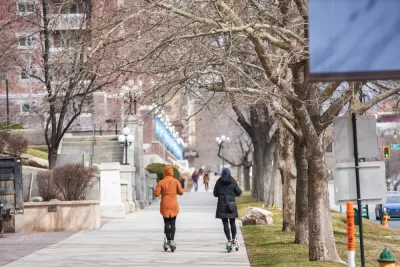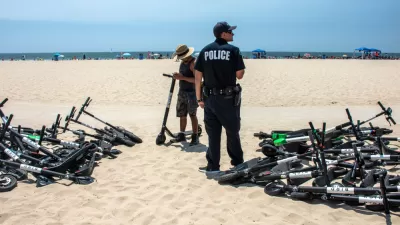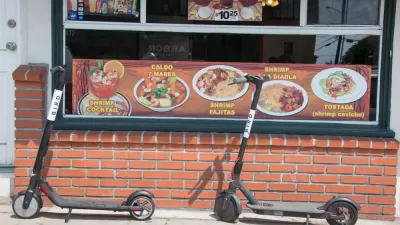An email survey of scooter riders in Salt Lake City would seem to make the case for more robust investment in high-quality active transportation infrastructure.

Taylor Stevens shares findings of a recent study conducted by Lime about scooter rider behavior in Salt Lake City.
"The email survey of 614 Lime users whose latest ride was in Salt Lake City found that sidewalk ridership increases by 310% when no bike lane is available; when one is, 82.2% say they ride in it," writes Stevens.
"Seven in 10 respondents said they would never ride on sidewalks if there were protected bike lanes, and more than 50% said painted bike lanes would help. Nearly half said greater enforcement of scooter regulations by police with a $50 ticket would have the same effect."
According to Stevens, sidewalk scooting has been one of the largest challenges reported with the four scooter share companies currently operating in the city. One hospital reported a 160 percent spike in emergency room visits involving electric scooters in September 2018 compared to the previous year (electric scooter companies weren't in operation during the same time period the previous year).
FULL STORY: Most scooter riders using the sidewalk are afraid of cars, new survey shows

Planetizen Federal Action Tracker
A weekly monitor of how Trump’s orders and actions are impacting planners and planning in America.

Chicago’s Ghost Rails
Just beneath the surface of the modern city lie the remnants of its expansive early 20th-century streetcar system.

San Antonio and Austin are Fusing Into one Massive Megaregion
The region spanning the two central Texas cities is growing fast, posing challenges for local infrastructure and water supplies.

Since Zion's Shuttles Went Electric “The Smog is Gone”
Visitors to Zion National Park can enjoy the canyon via the nation’s first fully electric park shuttle system.

Trump Distributing DOT Safety Funds at 1/10 Rate of Biden
Funds for Safe Streets and other transportation safety and equity programs are being held up by administrative reviews and conflicts with the Trump administration’s priorities.

German Cities Subsidize Taxis for Women Amid Wave of Violence
Free or low-cost taxi rides can help women navigate cities more safely, but critics say the programs don't address the root causes of violence against women.
Urban Design for Planners 1: Software Tools
This six-course series explores essential urban design concepts using open source software and equips planners with the tools they need to participate fully in the urban design process.
Planning for Universal Design
Learn the tools for implementing Universal Design in planning regulations.
planning NEXT
Appalachian Highlands Housing Partners
Mpact (founded as Rail~Volution)
City of Camden Redevelopment Agency
City of Astoria
City of Portland
City of Laramie





























